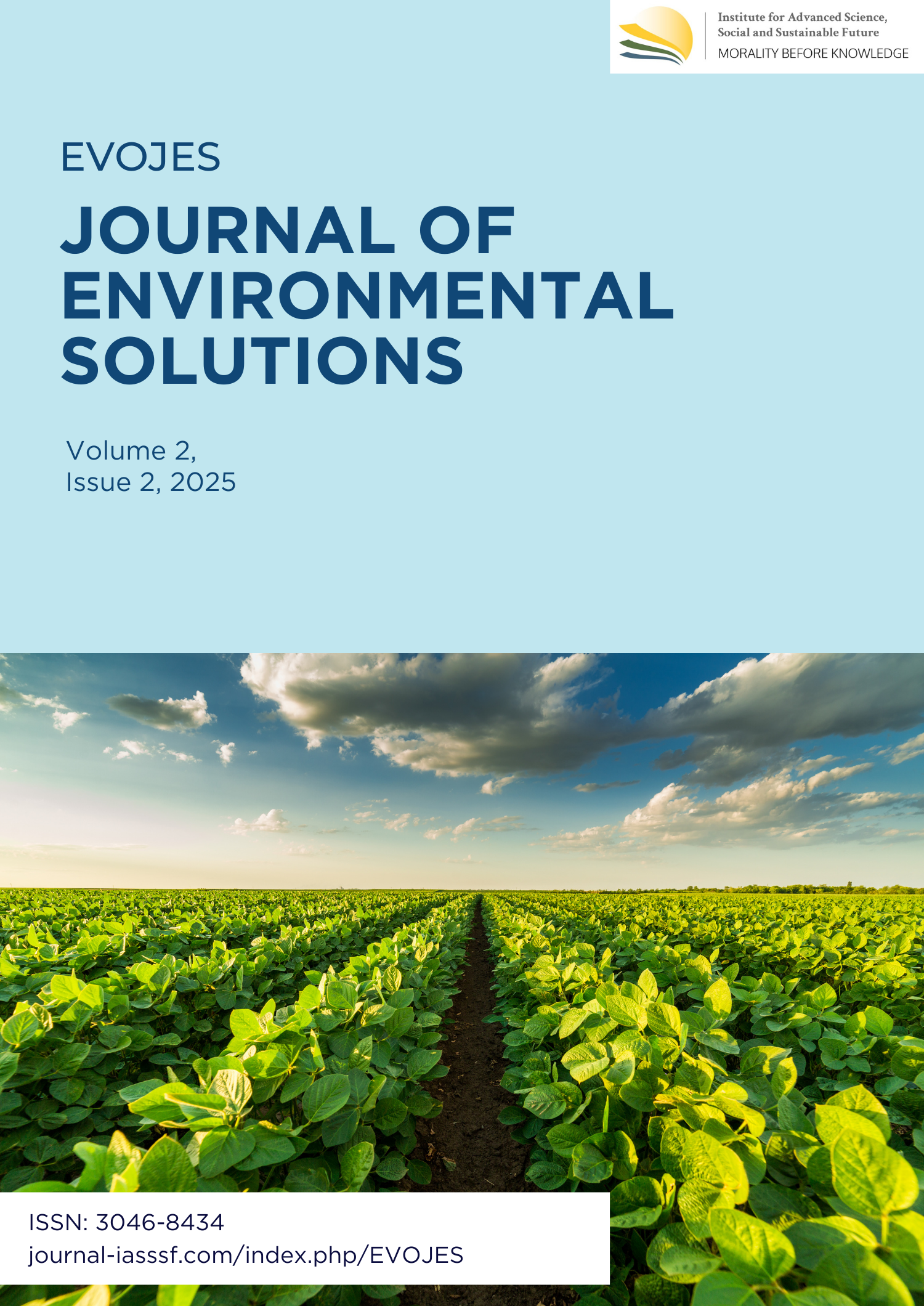Transforming organic waste into compost: An integrative approach to sustainable agriculture
DOI:
https://doi.org/10.61511/evojes.v2i2.2025.2236Keywords:
organic waste composting, sustainable waste management, environmental healthAbstract
Background: Pangkajene and Islands Regency (Pangkep) has a unique geographical character that combines the karst foothills of Pangkep–Maros with a cluster of islands in the Makassar Strait. This condition has given rise to an economy based on agriculture, fisheries, and industry, but on the other hand, it has also created waste management issues, particularly with regard to organic waste from households and traditional markets, which has the potential to cause odours, leachate, and greenhouse gas emissions if not managed properly. Method: The study used a descriptive-exploratory qualitative approach with an embedded case study. The main "case" was the ecosystem of organic waste utilisation for compost in Pangkep. Findings: This study shows that organic waste is still the dominant fraction in Pangkep Regency, but its management is not yet optimal, causing environmental problems such as odour, leachate, and potential greenhouse gas emissions. Conclusion: This study confirms that organic waste in Pangkep Regency has great potential to be processed into compost, but its utilisation is still far from optimal. Novelty/Originality of this article: The originality or uniqueness of this article lies in its focus, which not only discusses organic waste management as an environmental issue, but also directly links it to the needs of sustainable agriculture in Pangkep Regency. This article presents an integrative approach by combining the potential of municipal waste and rice straw as compost raw materials, while also assessing product quality based on the SNI 7763:2018/2024 standard.
References
Al Azizi, S. Q. (2022). DIRECTIONS FOR HANDLING SMALL ISLAND WASTE USING UAV IMAGES (UNMANNED AERIAL VEHICLE) (CASE STUDY: BALANG LOMPO ISLAND, PANGKEP REGENCY).
Amelia, J. R., Iryani, D. A., Indraningtyas, L., Sugiharto, R., Ginting, S., & Hasanudin, U. (2023). Management of Spent Bleaching Earth.
Arzaq, M. M. (2024). Analysis of Waste Management Strategies in Yogyakarta City, Through SWOT Analysis and Cost-Benefit Analysis of RDF Sales Potential. Retrieved from https://dspace.uii.ac.id/handle/123456789/53221
AYU, S. (2024). The Role of the Environmental Agency in Empowering the Economy of the Community Through the Waste Bank Programme in Parepare (Sharia Economic Analysis).
Badratin Nafis, 180702139. (2024). Planning of a Temporary Waste Processing Site for Reduce, Reuse, Recycle (TPS 3R) in Peukan Bada District, Aceh Besar Regency.
Haeqal, M. H. (2017). The Effect of Variations in Litter Weight on Compost Quality Using DunaTM Starter. Retrieved from https://repository.uinjkt.ac.id/dspace/handle/123456789/68456
Herman Djide: Turning Straw into Gold, an Organic Fertiliser Solution for Pangkep Rice Fields - INDONESIASATU.CO.ID. (n.d.). Retrieved 27 August 2025, from https://pangkep.indonesiasatu.co.id/herman-djide-ubah-jerami-jadi-emas-solusi-pupuk-organik-untuk-sawah-pangkep?utm_source=chatgpt.com
Khairunniah, S. (2024). Analysis of Compost Quality Based on Variations in Composting Methods Using the 3R TPS. Retrieved from https://dspace.uii.ac.id/handle/123456789/49572
KLHK Encourages the Community to Manage Organic Waste into Compost. (n.d.). Retrieved 27 August 2025, from https://www.menlhk.go.id/news/klhk-ajak-masyarakat-kelola-sampah-organik-jadi-kompos/?utm_source=chatgpt.com
Kögel‐Knabner, I., Zech, W., & Hatcher, P. G. (1988). Chemical composition of the organic matter in forest soils: The humus layer. Zeitschrift Für Pflanzenernährung Und Bodenkunde, 151(5), 331–340. doi:10.1002/jpln.19881510512
Kristianto, A. H., Marini, M. S., Sos, S., Yuliana, M. A., Kom, S., Kom, M., … Santoso, A. (2025). Circular Economy Related to Sustainable Development. YPAD Publisher. Retrieved from https://journal.yayasanpad.org/index.php/ypadbook/article/view/347
Kunthiyasari, D. H. (2024). Analysis of the Quantity of Modified Aerobic Reactor Solid Compost from Organic Waste using Black Soldier Fly (BSF) Maggots. Retrieved from https://dspace.uii.ac.id/handle/123456789/52136
Laia, I. A., Kasih, E. A., Gulo, D., Gulo, L. L., & Ndraha, A. B. (2025). The Impact of Organic Farming on Soil Quality and Rice Yields in the Nias Islands. Flora: Journal of Agricultural and Plantation Studies, 2(1), 177–187. doi:10.62951/FLORA.V2I1.263
Litaay, M. (2018a). Marine tunicates from the Sangkarang Archipelago, Indonesia: recent findings and bio-prospecting. Journal of Physics: Conference Series, 979(1), 012003. doi:10.1088/1742-6596/979/1/012003
Litaay, M. (2018b). Marine tunicates from Sangkarang Archipelago Indonesia: recent findings and bio-prospecting. Journal of Physics: Conference Series, 979(1), 012003. doi:10.1088/1742-6596/979/1/012003
Maros Pangkep UNESCO Global Geopark | UNESCO. (n.d.). Retrieved 27 August 2025, from https://www.unesco.org/en/iggp/geoparks/maros-pangkep?utm_source=chatgpt.com
Mendrofa, M. T., & Gulo, D. (2024). The Effect of Organic Fertiliser on Soil Structure and Stability Improvement. Journal of Agricultural and Fisheries Sciences, 1(1), 105–110. doi:10.70134/PENARIK.V2I2.72
Nurjannah, N., Afdatullah, L., Abdullah, D. N., Jaya, F., & Ifa, L. (2019). Production of Solid Organic Fertiliser Using Aerobic Methods. Journal of Chemical Process Engineering, 4(2), 90–96. doi:10.33536/JCPE.V4I2.467
Waste Management and Recycling to Reduce Greenhouse Gas Emissions in Urban Areas, O., Husna, F., Fajar Arum, W., Aryanti, E., Hadi, I., Master of Natural Resources and Environmental Management, P., & Correspondence, E. (2025). Optimisation of Waste Management and Recycling to Reduce Greenhouse Gas Emissions in Urban Areas. Lambda: Scientific Journal of Mathematics, Natural Sciences, and Their Applications, 5(1), 9–24. doi:10.58218/LAMBDA.V5I1.1029
Praptana, R. H. (2017). Acceleration of Aerobic Composting Process Using Biodecomposer. doi:10.21082/psp.v16n1.2017
Rismawati, M. (2022). Genetic Diversity of Local Indonesian Rice Germplasm and Introduction Based on Microsatellite Markers of the Early Maturity Gene and Resistance to Brown Planthopper Biotype 3.
Scholz, R., & Tietje, O. (2012). Embedded Case Study Methods. Embedded Case Study Methods. doi:10.4135/9781412984027
After a Year Under the Supervision of the National Strategic Plan for Plantation Crops, Collaboration Between State-Owned Enterprises and Regional-Owned Enterprises in Pangkep Finally Materialises. (n.d.). Retrieved 27 August 2025, from https://stranaspk.id/publikasi/berita/setahun-dikawal-stranas-pk-kolaborasi-bumn-bumd-di-pangkep-resmi-terealisasi?utm_source=chatgpt.com
Suherman, F. T. A. D. (2024). Analysis of Chemical Parameters of Compost Using the Vermicomposting Method on Dry Leaf Waste. Retrieved from https://dspace.uii.ac.id/handle/123456789/53355
ZULFIANI, Z. (2022). Bureaucratic Behaviour in the Implementation of the Independent Village Programme in Pangkep District.
Published
How to Cite
Issue
Section
Citation Check
License
Copyright (c) 2025 Sahdan Mustari, Yusriyanto

This work is licensed under a Creative Commons Attribution 4.0 International License.














